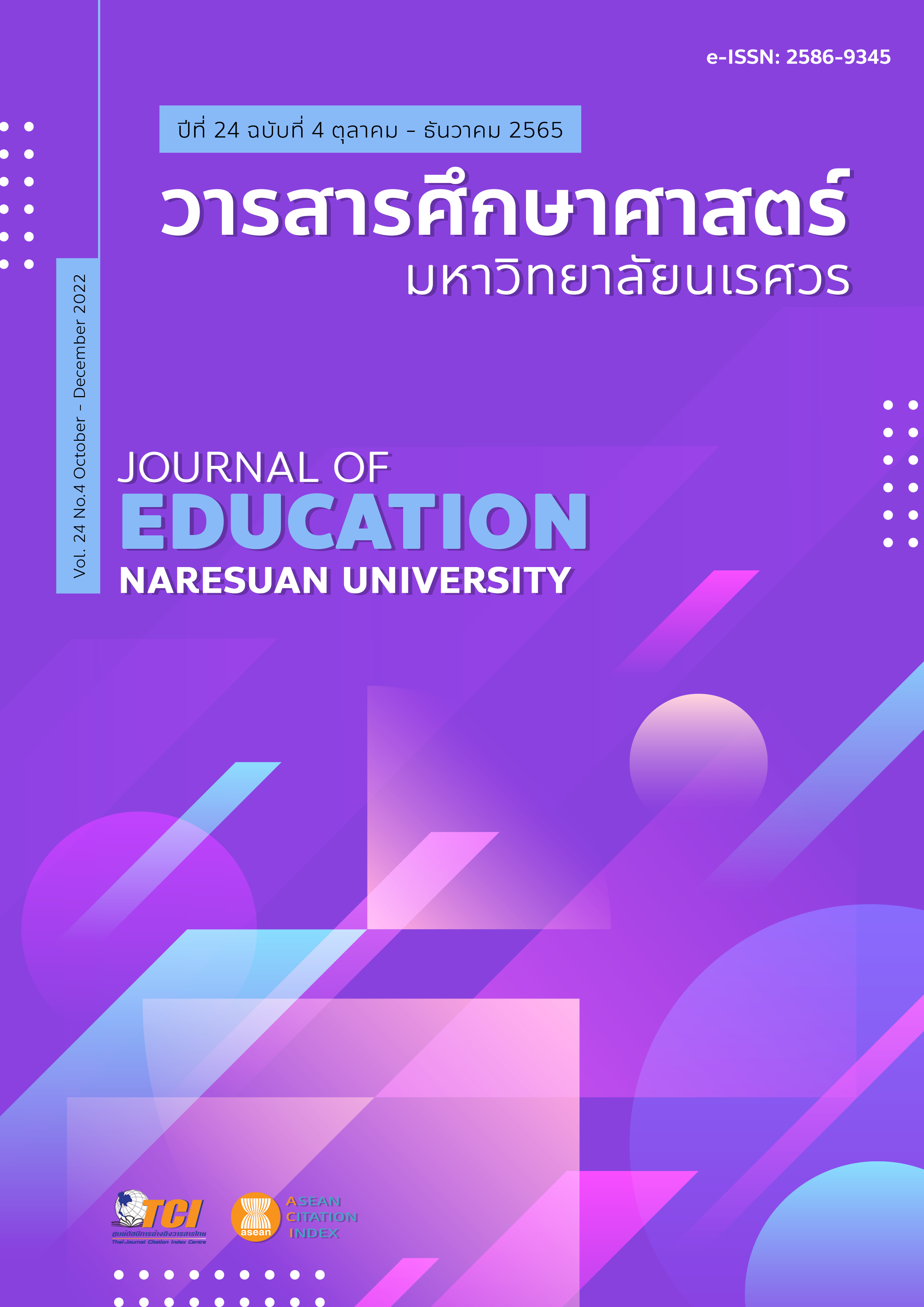ELECTRONIC TALE BOOK “LARGESSE” TO PROMOTE READING INTERPRETATION BY USING LEARNING MANAGEMENT WITH TEAM ASSISTED INDIVIDUALIZATION (TAI) TECHNIQUE FOR MATTHAYOMSUKSA 3 STUDENTS หนังสือนิทานอิเล็กทรอนิกส์ เรื่อง “การให้ทาน” เพื่อส่งเสริมการอ่านตีความ โดยใช้การจัดการเรียนรู้แบบร่วมมือด้วยเทคนิค TAI สำหรับนักเรียนชั้นมัธยมศึกษาปีที่ 3
Main Article Content
Abstract
Objectives of this research were 1) to create and find the efficiency of the electronic tale book “Largesse” to promote reading interpretation by using learning management with Team Assisted Individualization (TAI) technique for Mathayomsuksa 3 students in accordance with the 80/80 criteria. 2) To compare academic achievement before and after study. And 3) to study the group behavior of students during learning. The sample group was consisted of 24 students from Mathayomsuksa 3/2 of Sam Ngam Chanupatham School, Sam Ngam District, Phichit Province, which were selected by using Purposive Sampling by choosing a medium level classroom according to the classroom divided by the level of the learners. The research instruments were 1) an electronic tale book “Largesse” to promote reading interpretation by using learning management with Team Assisted Individualization (TAI) technique for Mathayomsuksa 3 students, 2) a lesson plan which used the TAI technique, a collaborative learning management model, along with the use of an electronic tale book “Largesse” to promote reading interpretation for Mathayomsuksa 3, 3) learning achievement test, and 4) student group behavior observation form. The data was analyzed by using mean (), standard deviation (SD), and a dependent t-test. The results of the study showed that: 1) the results of the creation of electronic tale book “Largesse” to promote reading interpretation by using learning management with Team Assisted Individualization (TAI) technique for Mathayomsuksa 3 students, showed that the quality was the highest (
= 4.87, SD = 0.21) and was tested on the students. It was effective 88.78/81.94 and complied with 80/80 standard; 2) students who studied with electronic tale book “Largesse” to promote reading interpretation by using learning management with Team Assisted Individualization (TAI) technique for Mathayomsuksa 3 students, the post-study achievement was statistically significantly higher than pre-study at the 0.05 level of confidence; And 3) student group behavior assessment results during the study, using the electronic tale book “Largesse” to promote reading interpretation by using learning management with Team Assisted Individualization (TAI) technique for Mathayomsuksa 3 students, were overall at the highest level (
= 4.92, SD = 0.16).
Article Details

This work is licensed under a Creative Commons Attribution-NonCommercial-NoDerivatives 4.0 International License.
The owner of the article does not copy or violate any of its copyright. If any copyright infringement occurs or prosecution, in any case, the Editorial Board is not involved in all the rights to the owner of the article to be performed.
References
Champasak, W. (2017). Development of e-Books on the nature of the names of Thai language learning groups for students in prathomsuksa 3 (Independent Study). Phitsanulok: Naresuan University. [in Thai]
Hayeete, A. (2016). Outcome of learning management on consonants and vowels, Malay Language for prathomsuksa 2 students at Bannamdam School by using a cooperative learning model (Master thesis). Yala: Yala Rajabhat University. [in Thai]
Inthanin, P. (2010). Storytelling Techniques. Bangkok: Suweeriyasarn. [in Thai]
Inthasorn, N. (2007). Comparison of Thai language learning achievement on words and types of words of Prathomsuksa 6 students who were taught by collaborative learning with TAI technique and normal teaching. (Master thesis). Bangkok: Silpakorn University. [in Thai]
Khammani, T. (2017). Different teaching styles. Bangkok: Chulalongkorn University Press. [in Thai]
Khunmathurot, S., & Kornpuang, A. (2020). Development of analytical thinking in literary and social subjects by using group processes. Report on the basis of the national academic conference (Proceedings) National
Symposium Phayao Research 9th (pp. 2456 – 2464). Phayao: Phayao University. [in Thai]
Ministry of Education. (2009). Indicators, core and subject matter. Thai language department according to the Basic Education Core Curriculum 2008. Bangkok: The Agricultural Cooperative Federation of Thailand. [in Thai]
National Institute of Educational Testing Service (Public Organization). (2019). Handbook of basic national education management (O-NET) matthayousuksa 3. Bangkok: National Institute of Educational Testing Service (Public Organization). [in Thai]
Prayutto, P. A. (2016). Dictionary of Buddhism (34th ed.). Ayudhya: Mahachulalongkornrajavidyalaya University. [in Thai]
Phadung, M. (2018). Development of interactive e-Books for learning Thai language. for students who speak Malay as their mother tongue in the Three Southern Border Provinces. Yala: Yala Rajabhat University. [in Thai]
Phukkaset, N. (2008). Development of the ready-made lessons in Thai language on story reading interpretation for students in mathayomsuksa 4, St. Francis Xavier School, Nonthaburi (Independent Study). Bangkok: Srinakharinwirot University. [in Thai]
Ploykrachang, K. (2013). Cooperative behavior of early childhood children that have been organized activities group molding (Master thesis). Bangkok: Srinakharinwirot University. [in Thai]
Sirh, C. T. (2018). Development of electronic books on Thai spelling section for Myanmar students Bachelor Degree Foreign Language University of Yangon Republic of the Union of Myanmar (Master thesis). Phitsanulok: Naresuan University. [in Thai]
Srifah, P. (2008). e-Book Talking book (2nd ed.). Bangkok: Than Printing Company. [in Thai]
Sukprasert, S. (2015). Thai language for teachers. Kamphaeng Phet: Faculty of Education, Kamphaeng Phet Rajabhat University. [in Thai]
Wichawong, P. (2019). Development of electronic books on understand about Cyberbullying by using case studies for junior high school students (Master thesis). Phitsanulok: Naresuan University. [in Thai]
Yongthawee, R. (2018). Research report on the development of the critical reading practice Thai language learning group prathomsuksa 6 by using the TAI techniques in cooperative teaching. Roi Et: Watsratong Municipal School. [in Thai]


